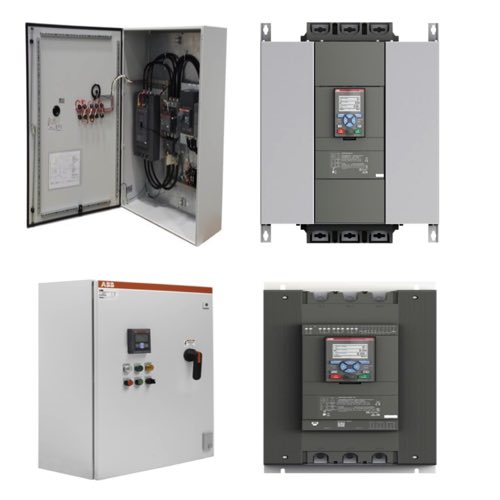ABB Soft Starters

RSP Supply carries a complete line of ABB soft starters designed to provide controlled motor acceleration, torque management, and dependable motor protection. By gradually increasing voltage during startup, these devices reduce inrush current, mechanical shock, and heat generation key factors that contribute to premature motor wear and electrical system strain.
ABB soft starters are commonly used in applications such as pumps, fans, compressors, and conveyors, where smooth startup and reliable performance are critical. Their design helps extend motor life, minimize maintenance requirements, and protect connected mechanical components from excessive stress during starting and stopping.
Engineered for heavy-duty industrial environments, ABB soft starters feature built-in bypass functionality, advanced protection features, and flexible control options. These capabilities ensure consistent operation across industries including water treatment, manufacturing, mining, and material handling, while maintaining system efficiency and long-term reliability.
FAQs
Q: What does an ABB soft starter do?
An ABB soft starter gradually increases voltage to an electric motor during startup, reducing inrush current, torque shock, and mechanical stress on the motor and connected equipment.
Q: What benefits do ABB soft starters provide in motor applications?
They reduce electrical and mechanical stress during startup, help prevent nuisance tripping, extend motor lifespan, and improve overall system reliability in full-speed motor applications.
Q: How do ABB soft starters improve efficiency?
Many models include built-in bypass functionality that reduces power losses and heat generation after startup, contributing to improved energy efficiency and reduced electrical wear.
Q: What’s the difference between a soft starter and a VFD?
Soft starters control motor startup and stopping only, while variable frequency drives (VFDs) provide continuous speed control and energy optimization throughout the entire motor operating cycle.
Q: Are ABB soft starters easy to install?
Yes. ABB soft starters are designed with user-friendly interfaces, flexible communication options, and straightforward configuration, allowing for efficient installation and commissioning.
Why Buy ABB Soft Starters from RSP Supply
RSP Supply offers a wide selection of ABB soft starters backed by trusted manufacturer engineering and proven industrial performance. Customers rely on RSP Supply for dependable product availability, technical expertise, and application-focused support. Our ABB soft starter solutions help ensure reliable motor protection, reduced downtime, and consistent operation in demanding industrial environments.

